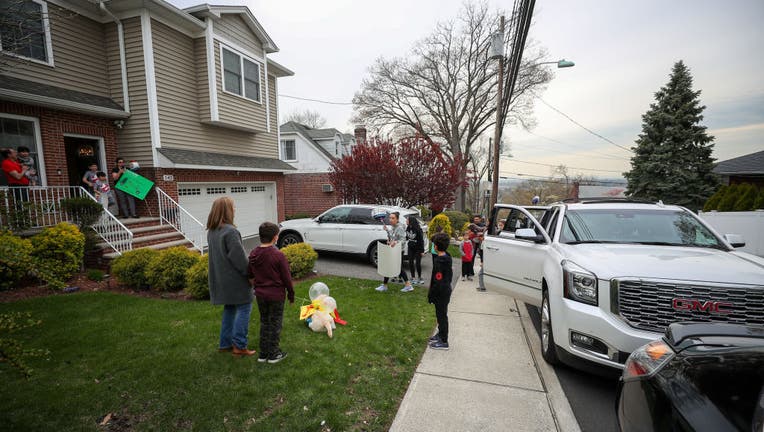Good, bad news in latest COVID-19 data, NJ governor reports

A New Jersey couple Stelios and Eva Calogeras celebrate the birthday of their son Michael who turns on his 2 years old with family friends in front of their house with social distances amid Covid-19 pandemic in New Jersey, United States on April 23,
TRENTON, N.J. (AP) — There was good and bad news in the state's efforts to contain the coronavirus outbreak, New Jersey Gov. Phil Murphy reported Friday.
The number of people hospitalized with the virus was down 17% from a high of about 8,300 hospitalizations on April 14 — moving in the right direction.
But the number of positive cases continues to climb, reaching 102,000 on Friday, with 253 more deaths, putting the death toll at 5,617.
It’s also taking less time for the number of positive cases to double, particularly in the southern part of the state, Murphy said. He wants to see the so-called doubling rate slow down.
The mixed results mean the state isn't yet ready to begin reopening. Murphy has said the state needs to ramp up testing and contact tracing.
For most people, the virus causes mild or moderate symptoms that clear up within weeks. Older adults and people with existing health problems are at higher risk of more severe illness.
More on other developments:
DON'T INGEST CLEANER
Health Commissioner Judy Persichilli warned the public Friday not to ingest or inject household cleaners. The warning came a day after President Donald Trump questioned whether cleaners should be studied as possible therapies to fight the virus.
“Do not ingest or inject disinfectants," Persichilli said.
___
INSPECTION SITES REMAIN CLOSED
New Jersey's motor vehicle inspection stations will be closed until May 11 as part of statewide efforts to stop the spread of COVID-19.
While inspection and road testing facilities will close, essential operations will continue, the Motor Vehicle Commission said in a statement. Those include supporting commercial trucking to keep the supply chain operating, the commission said.
Other services like renewing driver's licenses and registrations can be done online at NJMVC.gov.
The commissioner initially closed inspection stations from March 16 until March 30, followed by extensions that were set to expire on Monday.
Expiration dates for driver licenses, registrations, inspection stickers and temporary tags had been extended to May 13.
___
RUTGERS' RESPONSE
Rutgers University is slashing executives’ salaries and freezing tuition for undergraduates because of financial strain brought on by the coronavirus.
Rutgers President Robert Barchi said Friday in a statement that he, along with chancellors, executive vice presidents and coaches for football and men’s and women’s basketball will take a 10% pay cut for the next four months.
“The steps we are taking today will help us address the immediate impact of the COVID-19 outbreak, but they are only the beginning of what we must consider. Equally substantial steps will be needed as we craft a budget for the coming year,” Barchi wrote.
In-state tuition for the current school year is $12,230. Out-of-state tuition is $29,012.
Barchi said the university is also halting capital construction projects, banning university-sponsored travel, and freezing hiring, among other measures.
___
PORTRAIT OF RECOVERY
A northern New Jersey man who had the virus is home and recovering after spending the better part of a month fighting for his life at a local hospital.
Pedro Gonzalez spent more than three weeks on a ventilator at Hudson Regional Hospital in Secaucus before he woke up on Easter morning.
“It was a nightmare not really knowing what was going to happen,” his wife, Victoria, said Friday. “There are no words to explain what we went through.”
The 37-year-old hotel worker from Union City was on camera during the Friday conference call hosted by the hospital but didn’t speak. He sported a full beard that grew in during his hospital stay, but he intends to shave it off, Victoria Gonzalez said.
Gonzalez began feeling ill in mid-March and had a low-grade fever between 99 and 100 degrees, his wife said. Within several days his fever had risen to 102 and he was experiencing chest pains and having trouble breathing, prompting his primary care doctor to tell him to go to the hospital for tests.
He was one of the first patients to be admitted to the small, community hospital with the new coronavirus, hospital CEO Nizar Kifaieh said. Since then, the number of patients quadrupled before beginning a steep decline in the last several days, he said.
Gonzalez “deteriorated very quickly,” according to Kifaieh, and was soon put on a ventilator. The vast majority of patients who go on ventilators don’t survive, Kifaieh said, and Gonzalez “had a lot of ups and down” during the next few weeks as hospital staff employed a variety of treatments. His recovery “meant a tremendous amount” to hospital staff, Kifaieh said.
Staff members stayed positive and never gave up hope, Victoria Gonzalez said. “Without that, I don’t know what would have happened,” she said.

